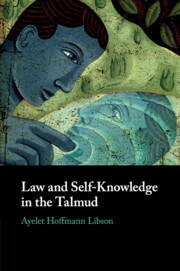Description
Law and Self-Knowledge in the Talmud
Author: Libson Ayelet Hoffmann
Highlights the emergence of self-knowledge in rabbinic literature, showing how Babylonian rabbis relied on knowledge accessible only to the individual to determine the law.
Language: English
Subject for Law and Self-Knowledge in the Talmud:
Approximative price 27.67 €
In Print (Delivery period: 14 days).
Add to cart
Law and Self-Knowledge in the Talmud
Publication date: 12-2019
Support: Print on demand
Publication date: 12-2019
Support: Print on demand
Approximative price 107.81 €
In Print (Delivery period: 14 days).
Add to cart
Law and Self-Knowledge in the Talmud
Publication date: 05-2018
224 p. · 15.7x23.5 cm · Hardback
Publication date: 05-2018
224 p. · 15.7x23.5 cm · Hardback
Description
/li>Contents
/li>Biography
/li>
This book examines the emergence of self-knowledge as a determining legal consideration among the rabbis of Late Antiquity, from the third to the seventh centuries CE. Based on close readings of rabbinic texts from Palestine and Babylonia, Ayelet Hoffmann Libson highlights a unique and surprising development in Talmudic jurisprudence, whereby legal decision-making incorporated personal and subjective information. She examines the central legal role accorded to individuals' knowledge of their bodies and mental states in areas of law as diverse as purity laws, family law and the laws of Sabbath. By focusing on subjectivity and self-reflection, the Babylonian rabbis transformed earlier legal practices in a way that cohered with the cultural concerns of other religious groups in Late Antiquity. They developed sophisticated ideas about the inner self and incorporated these notions into their distinctive discourse of law.
1. The inward turn in rabbinic literature; 2. Knowledge of the body: the case of sensation; 3. Asserting the needs of the body; 4. Between body and mind: the suffering self; 5. Self-knowledge and a wife's autonomy.
Ayelet Hoffmann Libson is an assistant professor at the Radzyner Law School at the Interdisciplinary Center, Herzliya, and the Gruss Visiting Assistant Professor in Talmudic Civic Law at Harvard University, Massachusetts. She is a graduate of the Hebrew University of Jerusalem (B.A.) and New York University (M.A., Ph.D.), and has held postdoctoral appointments at the Hebrew University and Tel Aviv University. She is also a research fellow at the Shalom Hartman Institute in Jerusalem, and has won fellowships from the Fulbright Foundation, the Lady Davis Foundation, and the Memorial Foundation for Jewish Culture.
© 2024 LAVOISIER S.A.S.
These books may interest you

Power, Ethics, and Ecology in Jewish Late AntiquityRabbinic Responses to Drought and Disaster 32.87 €



